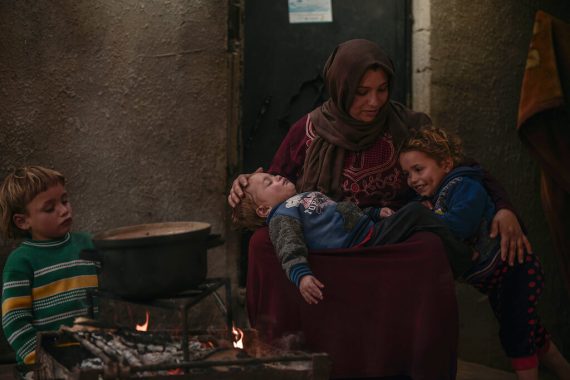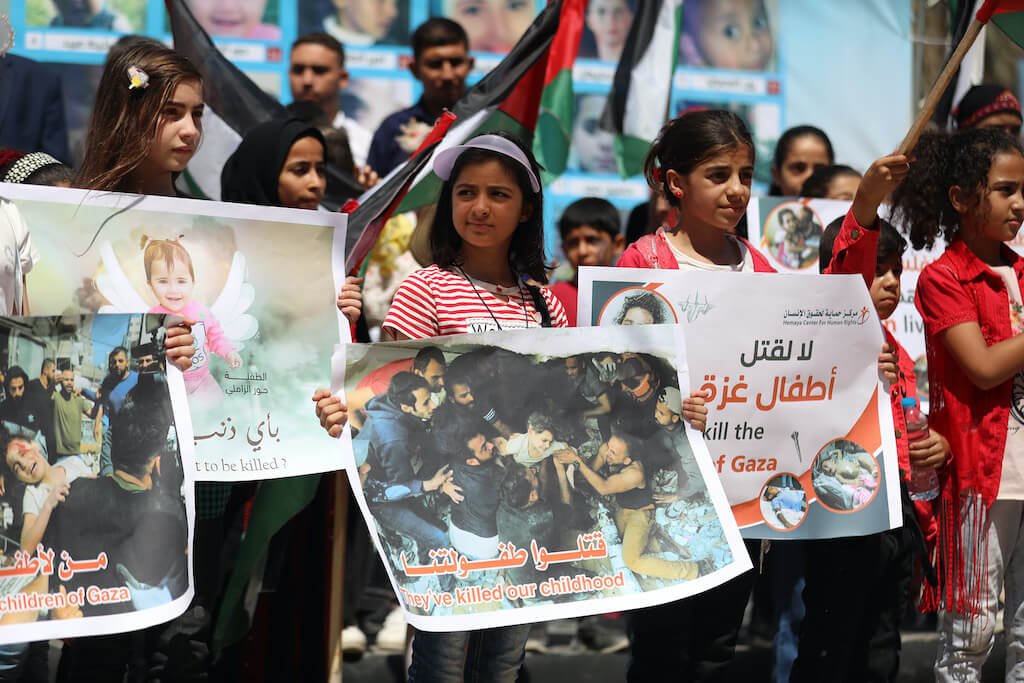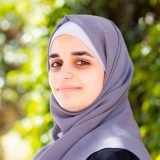On the morning of May 10, 2021, I rolled out of bed and headed to Capital Mall, Gaza’s only shopping mall. My plan was to buy a gray hat for my son Ayman (4) and pink hair clips for my daughter Mariam (3) to complement their Eid clothes. I wanted to please my kids and avoid their temper tantrums.
On the evening of the same day, however, my concern shifted to whether I will die or live, whether I will leave my kids behind or we will all die together.
On that evening, Israel started a war on the Gaza Strip and used internationally prohibited weapons: a total of 1,500 strikes took place in the 11-day war, injuring 1,900 Palestinians, and killing at least 260. Gaza health authorities reported 39 women, 17 elderly, and 66 children among the dead, and 1,800 houses, 3 towers, 437 apartments, and 3 mosques destroyed.
When the Israeli warplanes hit Gaza again recently, my daughter, Mariam, woke up from her nap, crying because of the loud noise. This brought back memories of the May war seven months ago.
A day before the war, we were eagerly awaiting Eid al-Fitr. I remember the smiley little faces of my kids while they rummaged through the shopping bags to see what I had bought. Mariam loved her new hair clips; however, Ayman didn’t like his new hat and tossed it to the side. I promised him I will replace it with whatever he liked. My kids are everything to me.
When the Israeli warplanes hit Gaza again recently, my daughter, Mariam, woke up from her nap, crying because of the loud noise. This brought back memories of the May war seven months ago.
A day after the start of the May war, we heard the shocking news that Israel had threatened to destroy the Hanadi Tower using warplanes. My thoughts traveled, “Is it going to be destroyed? Are they going to start a war? Is it our turn to die? What would happen to my kids if I were no longer around?”
As I thought of the many wars I experienced in Gaza, I remembered my grandmother. She was born in 1930. She lived through World War II, the British Mandate (1920-1947), the Nakba (1948), and the Naksa (Six-Day War,1967). She was married and had children during several wars. Likewise, my mother experienced the first and the second Intifadas.
In the span of 12 years, I experienced four wars in Gaza.
As for me, I always have had memories of the stories told by my mother and my grandmother, and I thought that wars happened to my people in the past.
In the span of 12 years, I experienced four wars in Gaza.
My thoughts were interrupted by the noise of bombing and the breaking news on TV: “Hanadi Tower is being bombed by the Israeli warplanes.” A huge tower leveled to the ground, becoming rubble in the blink of an eye. What could be worse than this?
I tried to look strong in front of my children who were waiting for an explanation from me. Ayman asked, “Mom, what is this sound?”
What should I answer? He hadn’t lived through such terrible events before, and he is too young to understand the horrible truth. So, I decided to lie. “They are fireworks to celebrate the coming Eid.”
He looked at me, unconvinced, and asked, “Why is this tower being destroyed on TV?”
I smiled sadly and said, “They destroyed it because it’s old and they didn’t want it anymore.” He was convinced.
The next day, Al-Shorouq Tower was also threatened to be leveled to the ground in ten minutes by Israeli warplanes. It hosted nothing but companies, businesses, and press offices and was located at the heart of Gaza City, opposite my family’s house. My parents didn’t have time to leave their home. I called my mother to beg them to come to my place, but she said, “There is not enough time and no vehicles to pick us up. If we go on foot, the shrapnel will kill us. And if the tower collapses on us, we will die.”
I couldn’t hold my tears, I hung up the phone, waited for their news, and sent my prayers to God. One of my eyes was on the TV and the other on the window waiting for an explosion to happen.
A few minutes later, the awaited explosion occurred and Al-Shorouq Tower was leveled to the ground by Israeli F-16s warplanes. I didn’t dare to call my parents. How would I live without them? I am still young and I needed them. Ayman interrupted my tears, “Mom, why are you crying? Don’t be sad, they don’t need this tower anymore; it is old,” he innocently comforted me.
I took a deep breath and played the strong mom’s role and lied again, “Yes, that is true. But I’m worried about your grandfather and grandmother.” I picked up my phone to call them. I received a message. My mother wrote to me: “Don’t worry. We are completely fine. The house was damaged badly, but it’s okay.”
Recommended
I was confused whether to feel happy for my parents’ safety or to feel sad for the disaster and destruction.
Every night, my husband and I would take shifts. One stays awake, and the other sleeps until the next explosion. We slept on the floor to protect our children from any flying glass.
Despite the danger that surrounded my mother, she used to contact me every single hour to make sure that we were fine. There is nothing in this world like a mother.
The morning after the war, I was busy cleaning the house, when little Ayman asked me, “Mom, did the fireworks end? Is today finally Eid? Can we go out now?” I said that we could. When I looked at him, he was putting on his gray hat, the one he had disliked before the war.
I smiled and thanked God that we were somehow back to our normal life.

VIDEO: Nakba Survivors Speak: “The sky was our blanket and the ground was our mattress”






